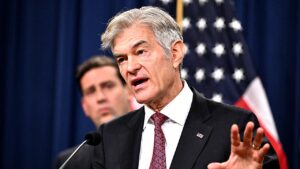Regular physical activity is widely recognized for its positive impact on both physical and mental well-being. However, the question of whether focusing on physical fitness goes against Christian beliefs has sparked some debate.
Concerns have been raised that prioritizing fitness could lead to “idol worship,” where the pursuit of physical improvement overshadows devotion to God.
Author Tim Keller, in his book “Counterfeit Gods: The Empty Promises of Money, Sex, and Power and the Only Hope that Matters,” defines an idol as anything that becomes more important than God, capturing more of one’s heart and imagination than God, or something one seeks to fulfill them in ways only God can.
Some argue that this definition could extend to exercise as well.
On the other hand, individuals like Hunter Sprague, a Christian bodybuilder and father of three from Texas, offer a different perspective.
After working in Christian ministry, Sprague leveraged his passion for fitness and strength training to establish Monolith Movement, a coaching and mentorship platform that assists men in harmonizing faith and fitness.
In an interview with Fox News Digital, Sprague views physical health as a form of spiritual stewardship, citing the New Testament verse from 1 Corinthians: “Your body is a temple of the Holy Spirit … therefore honor God with your body.”
Sprague acknowledges the historical Gnostic beliefs that disregarded the importance of the physical body and material world. He emphasizes the significance of the physical form, stating that it is a vital aspect of our designed existence.
He believes that exercise and fitness are ways of embracing the agency that the Lord has entrusted to individuals over their bodies. Sprague emphasizes stewardship, encouraging individuals to utilize their physical abilities for their own benefit and the benefit of others while expressing love for the Lord.
In his personal fitness routine, Sprague focuses on a combination of strength training and cardio. He highlights the importance of building muscle alongside weight loss and stresses the necessity of strength training for individuals who are overweight and lacking muscle mass.
For cardio, Sprague advises increasing daily steps to improve health and overall well-being. He suggests finding enjoyable ways to stay active throughout the day, such as walking and sprinting.
In terms of nutrition, Sprague follows a “modular eating” approach, incorporating lean proteins, fibrous vegetables, and carbohydrates. He tracks his food intake meticulously to align with his fitness goals.
Regarding supplements, Sprague keeps his regimen simple with creatine and monohydrate, occasionally using protein powders to meet his protein intake goals.
Sprague emphasizes the importance of recognizing the goodness of God in the pursuit of physical fitness. He views the experience as a means of grace, designed by the Lord to bring joy and fulfillment. Setting specific goals and committing to a plan of action are essential steps towards achieving success in physical fitness.
By acknowledging God’s goodness in the journey towards better health, individuals can find a deeper sense of purpose and fulfillment. Sprague encourages individuals to take action, set deadlines, and push themselves towards their fitness goals, emphasizing the importance of effort and dedication in the process.





